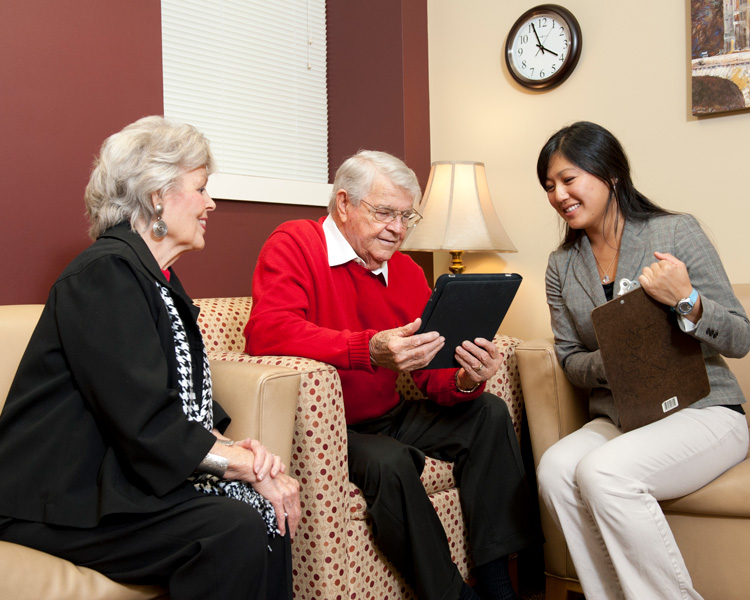Clinical geropsychology is a growing specialization, with board certification by the American Board of Professional Psychology, that attempts to meet the needs of the increasing older adult population. The Psychology Department at The University of Alabama offers a scientist-practitioner geropsychology subarea to prepare professionals for research and practice with older adults. Faculty within this subarea conduct intervention research (RCTs, pragmatic trials, demonstration projects) for older adults, dementia caregivers, and for individuals and families near the end of life; applied research in cognition; decision-making (medical, financial, and independent living); person-centered organizational culture change; quality of formal and informal long-term care; and clinical education and training with an emphasis on community-engaged work.
For more details, see the clinical geropsychology curriculum, or find affiliated faculty in the department directory.
Coordinator: Dr. Rebecca Allen
Research Topics
Specific research topics include
- cultural dynamics (race/ethnicity; rural/urban) related to medical consent, financial decision making, and independent living capacity;
- interventions to reduce the stress of individuals, family, and professional caregivers within the context of advanced chronic or terminal illness;
- acceptance and commitment therapy and other mindfulness-based interventions for older adults;
- ethics;
- racial/ethnic and geographic disparities;
- and clinical training issues (e.g., substance and opioid use disorders; empowering underserved communities to facilitate effective treatment delivery through community-based partnerships; health and mental health disparities; capacity assessment training).
Clinical Training Opportunities

The UA Geropsychology subarea offers a wide variety of clinical training opportunities with older adult populations, including
- Geropsychology Clinic (required): This specialty clinic housed in the department’s Psychology Clinic offers psychotherapy and assessment services. Psychology graduate students provide individual and family psychotherapy to older adults in the clinic or in the home. Students also have opportunities to conduct cognitive assessments and civil capacity evaluations in the areas of medical consent (including capacity to execute advance directives), financial decision-making, and independent living. This clinic is one of several specialty clinics in the department’s Psychology Clinic.
- University Medical Center Geriatrics Clinic (required): Psychology graduate students work as part of an interprofessional team with geriatricians, social workers, pharmacists, and family practice residents to provide assessment within the context of primary care to older adult outpatients.
- Mary S. Harper Geriatric Psychiatry Center (optional paid placement): Psychology graduate students conduct assessment and consultative services and provide group and individual psychotherapy to geriatric psychiatric inpatients.
- Hospice of West Alabama (optional volunteer placement): Psychology graduate students work as “volunteers” with individuals receiving hospice care and their family members in-home or in the 15-bed inpatient facility. The opportunity to sit in on bereavement groups is also available.
- Geriatrics and Extended Care at the Tuscaloosa VA Medical Center (optional volunteer placement): The geropsychology rotation blends teaching and practice, informed by science. The rotation includes furthering the student’s knowledge and practice of evidence-based treatments to a unique and ever-growing older population. This is done in concert with the supervisor so that the student grows in independence in applying a variety of psychotherapies for this population. An important component to this rotation is also the use of testing and assessment for neurocognitive disorders, informing differential diagnoses, degrees of capacity, and the application of therapy. This rotation exposes students to cognitive assessments and to experience how the results are then applied clinically to the individual.
- Residential Rehabilitation Treatment Program (RRTP) at the Tuscaloosa VA Medical Center (optional volunteer placement (optional volunteer placement): The RRTP is a 140-bed residential rehabilitation unit with several programs: PTSD, Substance Use Disorders, and Domiciliary Care for Homeless Veterans. Veterans typically stay as residents for approximately two months and engage in a variety of treatments during their stay. Students on this rotation will have a variety of clinical exposures with a very diverse veteran population. Veterans come from many service eras, all branches of service, with varied psychosocial histories. The most common problems seen on the unit are substance use disorders, PTSD, homelessness, and mood and anxiety disorders. A student’s clinical time may be split among seeing individual patients, co-leading therapy groups, and conducting psychodiagnostic assessments. RRTP staff includes case managers (RNs, social workers, and addictions therapists), psychiatrists, clinical pharmacists, nursing staff (nurse managers, RNs, LPNs, NAs), nurse practitioners, and dieticians, among others.